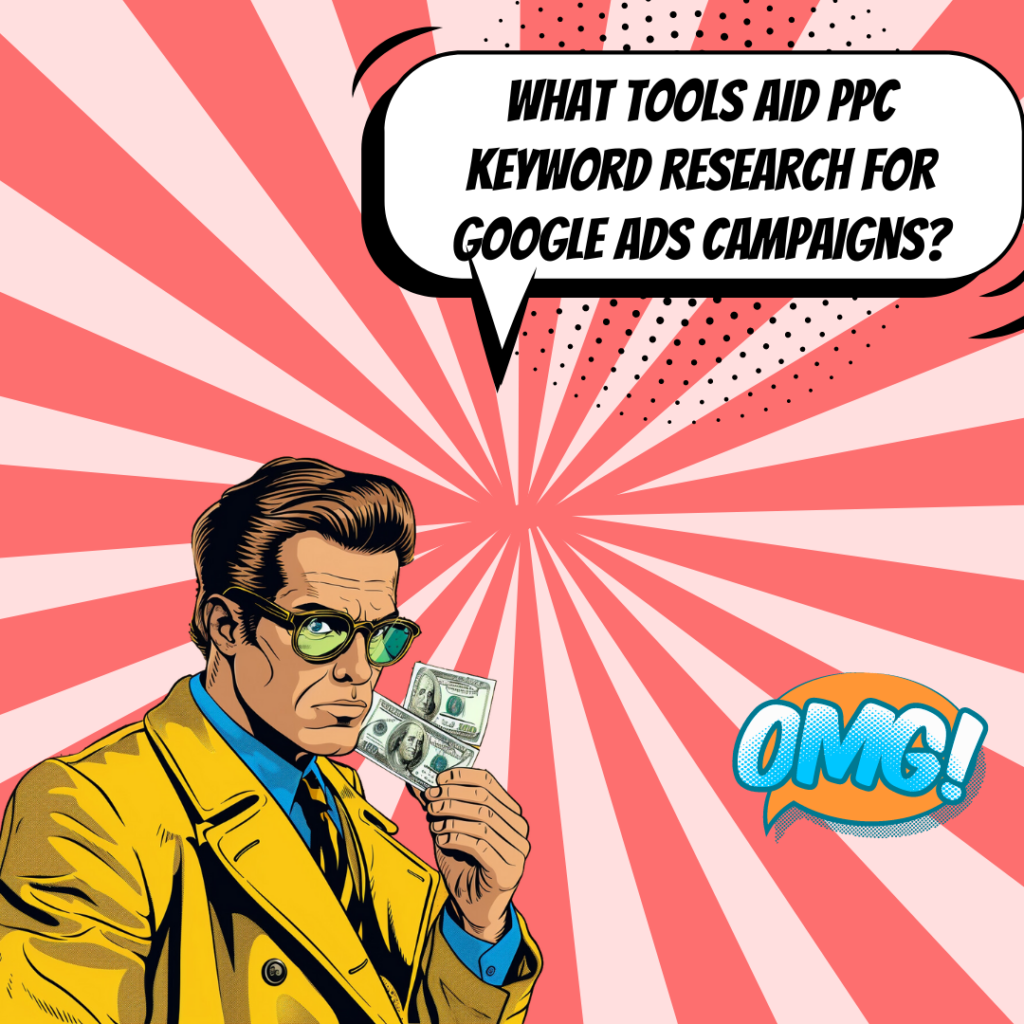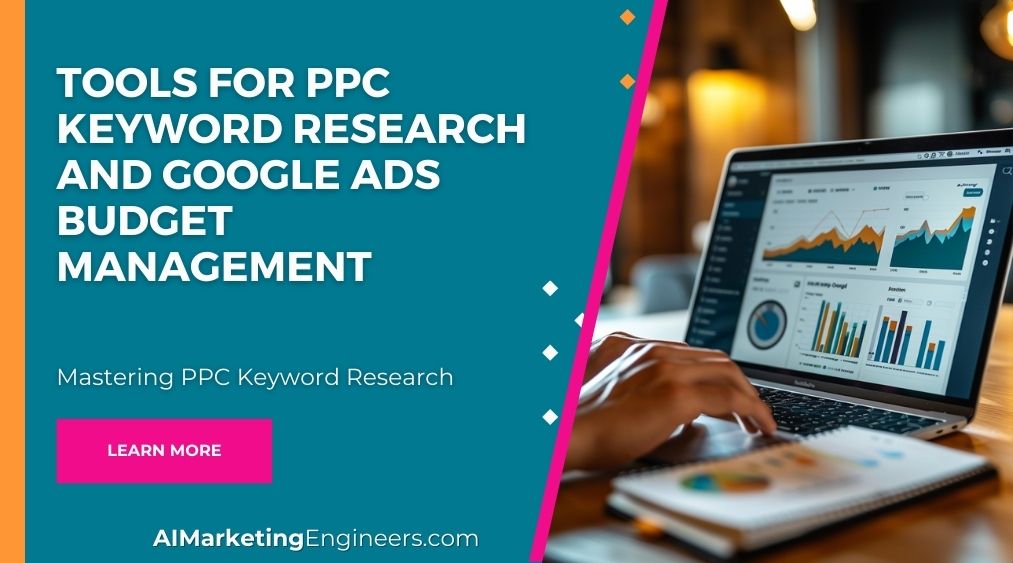Key Takeaways
✅ Variety of Tools Available: Dive into a world where PPC keyword research tools abound, offering an array of options to enhance your campaign strategy. From the intuitive Google Ads Keyword Planner to advanced platforms like SEMrush and Ahrefs, advertisers have access to a wealth of data that informs search volume analysis, keyword relevancy, and competitive campaign optimization.
✅ Google Ads Budget Management: Mastering the art of Google Ads budget management is paramount for campaign success. Learn to navigate the monetary maze with tools that guide you in setting realistic budgets based on pertinent keywords, competitive analysis, and market demand. Tracking and analyzing metrics like click-through rates and cost-per-click will empower you to maximize your budget's effectiveness.
✅ Integration and Tracking: Leverage the power of integrating keyword research tools with your Google Ads to maximize campaign performance. Regular monitoring and tracking of essential metrics pave the way for insightful adjustments to your keyword strategy, ensuring optimal use of your ad spend and a robust return on investment.

Introduction
Are you looking to get the most bang for your buck in the competitive realm of pay-per-click advertising? In the bustling world of digital marketing, making informed decisions is key to gaining that edge over your rivals. With the right tools for PPC keyword research and Google Ads budget management, advertisers can demystify the complexity of online campaigns and carve out a path to success.
Seizing your audience's attention while efficiently allocating your funds can seem like a daunting task. But what if you had a GPS guiding you through the intricate PPC landscape? Tools ranging from comprehensive to niche-specific offer insights that can propel your campaigns from good to outstanding. And it's not just about spending money. It's about spending it wisely and strategically to see those conversion rates soar and your business thrive.
In this comprehensive guide, we'll not only highlight the importance of adept keyword research and budget wrangling but also provide you with actionable recommendations, cutting-edge trends, and practical solutions to elevate your ROAS (Return on Ad Spend) and ROI (Return on Investment). Get ready for an insightful journey that promises to leave you with valuable tools and knowledge to revolutionize your PPC campaigns. Embark on this path, and you'll soon uncover groundbreaking information that will redefine your digital advertising approach.
Top Statistics
| Statistic | Insight |
|---|---|
| PPC Keyword Research Tools Market Growth: Predicted to grow at a CAGR of 12.4% from 2023 to 2028. | This signals a robust market expansion , highlighting the burgeoning demand and innovation within the PPC industry. |
| Global Digital Advertising Market Value: Projected to reach $455.4 billion by 2026. | With Google Ads as a driving force, this statistic underscores the importance of effective Google Ads budget management strategies. |
| Keyword Research Tools Usage: 71% of PPC professionals rely on these tools for campaign optimization. | The high utilization rate underscores the indispensable role of keyword tools in aligning with consumer search behavior. |
| PPC Automation Increase: 62% of PPC professionals plan to up their use of automation next year. | Anticipation for more automation indicates a shift towards efficiency and the potential for higher ROI in PPC campaigns. |
| Google Ads Monthly Budget: The average monthly budget ranges from $5,000 to $10,000. | Knowing the average spend can help businesses benchmark their own budgets against industry norms. |
Google Ads Keyword Planner: Your Campaign's Starting Block
Google Ads Keyword Planner stands as a go-to tool for many marketers. It's not only free but also directly tied to your Google Ads campaigns, offering keyword discovery, search volume trends, and forecasting. The best part? The planner suggests bid estimates, helping manage your spend from the get-go. With ad copy analysis, it's like having a campaign advisor that knows the ins and outs of Google's playground. Additionally, it helps identify long-tail keywords that might be less competitive but highly relevant to your audience. This tool also allows for localization, enabling you to target specific geographic regions effectively. By regularly updating your keyword list based on performance insights, you can keep your campaigns agile and responsive to market changes.
SEMrush Advertising Research: A Deeper Dive into Competitor Strategies
SEMrush offers a suite of tools that are crucial for dissecting competitor strategies. You get to peek into the keywords they're betting on and the ad copy that's winning them clicks. Although SEMrush has a free version, the real meat lies in the paid plans, which provide access to budget estimates and detailed traffic analysis, starting at $129.95 a month. With historical data analysis at your fingertips, past trends can inform future strategies. SEMrush also offers insights into the best-performing ads and their respective landing pages, helping you understand what drives conversions. The tool's competitive positioning map visualizes your market standing, offering a strategic advantage. Additionally, SEMrush's robust reporting capabilities allow for regular performance reviews, ensuring your strategies stay on track.
Diversify Your Toolbox with Additional PPC Keyword Research Tools
While Google Ads Keyword Planner and SEMrush are powerhouses, it's worth exploring others like Moz Keyword Explorer, SpyFu, Optmyzr, and Opteo. Each tool brings its strengths to the table—be it Moz's SEO-infused insights or SpyFu's deep dive into competitive keyword auctions. They offer unique perspectives that can refine your keyword selection and budget allocation. For instance, Moz Keyword Explorer excels in finding keywords with high potential and low difficulty, perfect for optimizing your SEO alongside PPC. Optmyzr offers automated bid adjustments, saving time while ensuring budget efficiency. Opteo provides real-time performance alerts, helping you make quick, informed decisions. Integrating these tools into your strategy can provide a comprehensive approach to PPC campaign management.
Managing Your Google Ads Budget Effectively
Just as crucial as keyword selections is your budget management. Pouring money into the wrong keywords is like throwing your budget into a black hole. Use Google Ads Keyword Planner not only to forecast possible spends but also to tweak bid estimates in real time. SEMrush complements with competitor budget insights, making sure you know where you stand in the market's bidding war. Additionally, setting daily and monthly spending caps within Google Ads ensures you don't exceed your budget. Regularly reviewing performance data helps in reallocating funds to high-performing keywords and campaigns. Utilizing automated rules and alerts can further optimize your spending, preventing budget drain on underperforming ads.
Cutting Through the Clutter: Choosing the Right Tools
Navigating the sea of PPC tools can be daunting. Each marketer's needs differ, so your toolkit choices should align with your campaign goals and complexity. Whether it's the finesse of keyword selection or the precision in budget distribution, there's no one-size-fits-all solution. But remember, effective keyword research coupled with smart budget management lays the groundwork for PPC success. Consider the unique features and integrations of each tool to enhance your overall strategy. Trial periods can help determine which tools best meet your needs before committing. By keeping abreast of new tool developments and updates, you can continually refine and improve your PPC efforts.
Optimizing Your PPC Campaign Performance
By understanding these tools' features and benefits, the path to optimizing your PPC campaigns becomes clearer. Are you currently equipped with the knowledge to pick the best words and spend your money wisely? If not, take the time to explore these tools and consider how they can elevate your campaign performance. Consistently monitor key performance indicators (KPIs) to measure success and identify areas for improvement. Regular A/B testing of ad copies and landing pages can lead to incremental gains in conversion rates. Finally, staying updated with industry trends and best practices ensures your PPC strategies remain effective in an ever-evolving digital landscape.
AI Marketing Engineers Recommendation
Recommendation 1: Utilize 'SEMrush' for competition-driven keyword insights: Dive into SEMrush's comprehensive database to analyze competitors' keyword strategies. According to a 2022 report by SEMrush, users who conduct competitive keyword analysis can improve their click-through rate by up to 10%. SEMrush allows you to observe which keywords are bringing traffic to your competitors, providing a benchmark for your own PPC campaigns. Moreover, it can reveal gaps in their strategies that you can exploit. This level of insight helps you to create more targeted campaigns, potentially reducing your cost per click (CPC) while maximizing your return on investment (ROI).
Recommendation 2: Embrace 'Google's Keyword Planner' for tailor-fitted keyword discovery: Staying current means leveraging tools that have direct data feeds from the largest search engine itself. Google's Keyword Planner, a product of continual improvement and AI integrations, provides real-time search data and trends. It's imperative to note that 64.6% of people click on Google ads when they are looking to buy an item online, as reported by Wordstream. Therefore, finding the right keywords is critical, and Google's Keyword Planner can help identify those with the highest potential for conversion. It suggests bid estimates for each keyword, so you can determine your advertising budget effectively.
Recommendation 3: Implement 'Google Ads Editor' for bulk budget management: For larger scale PPC campaigns, Google Ads Editor is an indispensable tool. With it, you can manage your Google Ads campaigns offline and make bulk changes quickly – a necessity when dealing with numerous campaigns and substantial budgets. What makes this tool highly relevant is its capability to make extensive adjustments across multiple campaigns, which can save hours and reduce the likelihood of manual errors. Further, it aids in streamlined budget allocation, allowing adjustments for optimal spending. This practical application demonstrates its worth by enhancing efficiency, something that could well be reflected in your campaigns' overall performance.
Relevant Links
- Crack the Code: Mastering Digital Marketing in China
- Conquer the Chinese Short-Video Scene: Strategies for Success
- Master the Art of Korean SEO and Lead the Online Retail Race
- Insights for Success: Chinese Consumer Behavior in 2024
- Command the German Digital Stage: Tactics for SEO and Social Media
Conclusion
In the dynamic world of digital advertising, tools for PPC keyword research and Google Ads budget management are instrumental in crafting successful campaigns. From the indispensable Google Ads Keyword Planner's capabilities in keyword discovery and budget planning, to SEMrush's detailed insights into competitor strategies and historical data, each tool offers a unique vantage point for advertising success.
Yet, it’s not just about the tools themselves, but how they are wielded. Proper budget allocation and prudent keyword selection can significantly impact the reach and effectiveness of your Google Ads. The plethora of options available, including Moz Keyword Explorer, SpyFu, Optmyzr, and Opteo, provide a rich arsenal for the discerning marketer. Making an informed choice requires understanding the distinct features and benefits each tool provides. Are you aligning your budget with realistic forecasts? Do you deeply understand your competitors' tactics? Are your campaigns optimized based on solid, data-driven insights? These are the questions that need to be asked to truly harness the power of these tools.
As we wrap up, remember that while tools facilitate strategy, it's your expertise and creativity that bring campaigns to life. So, dive into these tools with a clear goal, utilize their strengths, and manage your campaigns with the precision they deserve. The right tool, when matched with a savvy marketer’s acumen, can lead to PPC success and a strong return on investment. With the digital marketing landscape evolving, keeping pace means continuously exploring and mastering these significant instruments. Are you ready to take your PPC campaigns to the next level?
FAQs
Question 1: What is PPC keyword research?
Answer: PPC keyword research is all about finding the right keywords for your ads to get them in front of the right people. You want to pick words or phrases related to your products or services that folks are actually typing into search engines.
Question 2: What is Google Ads Keyword Planner?
Answer: This handy tool is like your trusty compass in the vast sea of Google Ads. It's totally free and shows you the ropes when it comes to finding keywords, figuring out how often they're searched, and even how much it might cost to advertise with them.
Question 3: What are the key features of Google Ads Keyword Planner?
Answer: Think of it as your multi-tool for keyword research: you get to see new keyword ideas, how popular they are, cost estimates for ads, and options to really narrow down your list to pinpoint your audience, whether you’re keeping an eye out for brand names or different websites.
Question 4: How does Google Ads Keyword Planner compare to other keyword research tools?
Answer: Google's own is pretty solid, but sometimes you need a bit more firepower. Other tools like Semrush or Moz can give you a peek at what the competition is up to, help make your content better, or give deeper insights into specific keywords that might make a difference for you.
Question 5: What are some alternative tools for PPC keyword research?
Answer: The toolbox is full of gadgets like Semrush for spying on competitors, Moz for smart SEO planning, Long Tail Pro for digging deeper into keywords, and even simple ones like Kombinator and Merge Words for when you need to whip up a big list of keywords fast.
Question 6: How do I optimize my Google Ads budget?
Answer: You start by setting clear goals. Use the Keyword Planner to figure out how much to spend on which keywords, and keep an eagle eye on your campaigns to tweak them for the best performance. Don't forget about Google's Smart Bidding - it can be like having a co-pilot for your budgeting.
Question 7: How do I get started with Google Ads Keyword Planner?
Answer: Just jump into your Google Ads account, toss in some seed keywords, and the Planner will start churning out suggestions. It'll show you all the numbers you need to know - like search volume and how much you might spend - so you can put a solid plan together.
Question 8: What are some best practices for using Google Ads Keyword Planner?
Answer: Mix it up with different kinds of keywords, stay sharp by keeping an eye on the number of searches and competition, and keep polishing your keyword list. And don't just stop with one tool - blend the insights from Keyword Planner with other tools for the full picture.
Question 9: How can I improve my PPC campaign performance?
Answer: Keep tweaking and tuning your campaigns, refine your ads and landing pages to connect better with your audience, use negative keywords to keep out the traffic you don't want, and don't be afraid to try different ways of bidding and different kinds of ads.











